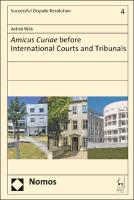Amicus Curiae before International Courts and Tribunals
| dc.contributor.author | Wiik, Astrid | |
| dc.date.accessioned | 2020-12-15T14:14:07Z | |
| dc.date.available | 2020-12-15T14:14:07Z | |
| dc.date.issued | 2018 | |
| dc.identifier.uri | https://library.oapen.org/handle/20.500.12657/43984 | |
| dc.description.abstract | Amicus curiae participation in international courts is steadily growing since the late 1990 despite lack of clarity on the concept’s nature, function and utility in international dispute settlement. Does amicus curiae infuse international judicial proceedings with alternative views, including the public interest in a case, as often advocated by NGOs? Does it increase the legitimacy and transparency of international dispute settlement, or the coherence of international law? Or is it an unhelpful impostor that impedes negotiated solutions and derails the proceedings at the expense of the parties to advance its own agenda? By way of an empirical-comparative analysis of the laws and practices of the ICJ, the ITLOS, the ECtHR, the IACtHR, the IACtHPR, WTO panels and the Appellate Body, and investment arbitration the dissertation examines the status quo of amicus curiae before international courts and tribunals to determine if the current amicus curiae practice is of added value to international proceedings and international dispute settlement in general. The dissertation shows that there is no common concept of international amicus curiae, but that amicus curiae before the international courts examined share a few characteristics. A proposed functional systematization highlights overlaps and diverging uses of the concept before international courts and helps scholars and practitioners to assess the opportunities and limits of the concept. Analysis of the concept’s current regulatory framework and its substantive effectiveness reveals a hesitation in particular by courts with a strong adversarial tradition to take into account the views of a non-party despite the positive experience with the concept in regional human rights courts. The dissertation concludes that neither the expectations nor the concerns attached to amicus curiae participation in international proceedings have materialized. It argues that the concept can contribute to improved decisions and decision-making in international dispute settlement if regulated and used properly. | |
| dc.language | English | |
| dc.subject.classification | thema EDItEUR::L Law::LA Jurisprudence and general issues | en_US |
| dc.subject.other | Law | |
| dc.subject.other | General | |
| dc.title | Amicus Curiae before International Courts and Tribunals | |
| dc.type | book | |
| oapen.identifier.doi | https://doi.org/10.5771/9783845275925 | |
| oapen.relation.isPublishedBy | a828cf6c-76dd-4fdb-b400-ec5fba9459b8 | |
| oapen.relation.isFundedBy | b818ba9d-2dd9-4fd7-a364-7f305aef7ee9 | |
| oapen.relation.isbn | 9783845275925 | |
| oapen.collection | Knowledge Unlatched (KU) | |
| oapen.imprint | Nomos Verlagsgesellschaft mbH & Co. KG | |
| oapen.identifier | https://openresearchlibrary.org/viewer/59c60cbd-a31d-4572-b607-86b310ac980b | |
| oapen.identifier.isbn | 9783845275925 | |
| grantor.number | 104697 |

